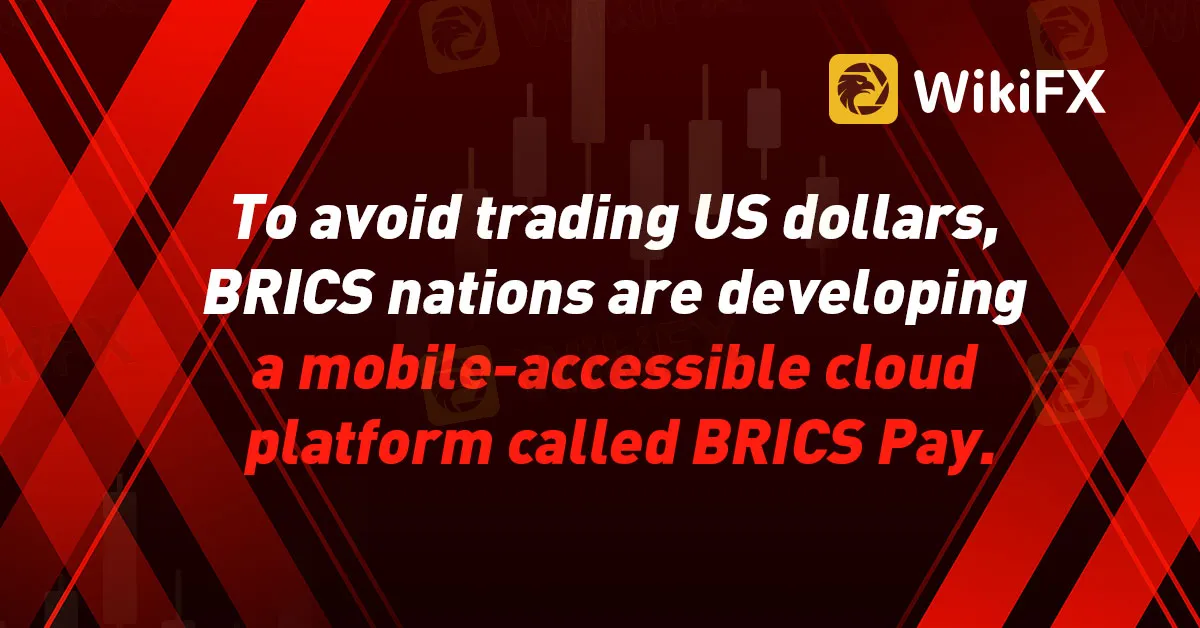Abstract:Brazil, Russia, India, China, and South Africa, together known as BRICS, are developing a single payment system called BRICS Pay as part of their effort to create a standard system for cross-border retail payments and transactions.

Brazil, Russia, India, China, and South Africa, together known as BRICS, are developing a single payment system called BRICS Pay as part of their effort to create a standard system for cross-border retail payments and transactions.
These countries, who are all among the most influential and powerful rising economies in the world, intend to launch a unique cloud platform that will link their national payment systems. In order to make purchases in any of the five BRICS nations, independent of the currency the payment and the money in the buyer's account are denominated in, an online wallet with access to various payment systems and mobile apps like to Apple Pay will be created.
As a result, citizens of Brazil, Russia, India, China, and South Africa will be able to make direct exchanges in their home currencies for foreign payments. On the road to dedollarization and a decoupling from the current US-controlled global banking system, this is viewed as a significant step.
Particularly China and Russia have been harshly critical of the United States' de facto use of global payment systems as trade and sanctions tools to either punish or restrain countries whose policies do not align with those of Washington. Both parties have been actively working to dedollarize their trade for some time, and the BRICS Pay system represents a significant step in that regard. The potential creation of a BRICS cryptocurrency has also been considered by the BRICS countries.
Innovative payment methods like Apple Pay and Samsung Pay are already well-liked in China and India. They have also recently gained popularity in Russia, where the Mir Pay payment service was launched earlier this year for Mir card users; it is now accessible on Android-based smartphones.
The BRICS Pay contactless payment system simply acts as a service to link the credit or debit cards of the citizens of the five BRICS countries to online wallets, giving them the option to pay using a smartphone. It will not replace their respective national payment systems. At the same time, national payment systems—which are gradually displacing Visa and MasterCard—will gain popularity as a result of BRICS Pay. The Chinese system UnionPay, which is the market leader and surpassed Visa in terms of total operations in 2015, is particularly noticeable in Southeast Asia and Russia. Over 6 billion cards have already been produced by UnionPay.
The magnitude of China's economy, the size of its domestic market, the sheer volume of its population, and the growth of its international tourists have all contributed to UnionPay's rising popularity. Now, the Huawei Telecommunications Corporation in China is introducing its own system in Russia called Huawei Pay in conjunction with the UnionPay payment service. After China, Russia will be the second nation to support Huawei Pay.
Although smaller in scope than China's, the national payment systems of the other BRICS countries have seen positive trends. 500 million national cards have already been issued by India's RuPay payment system, 120 million by Brazil's ELO, and roughly 50 million by Russia's Mir system.
According to the Federal Antimonopoly Service of the nation, which was published in the Russian media, the Mir national card system displaced Visa from the market for payment systems by roughly 5.5 percent and MasterCard by 6 percent in 2018. Russians' use of Visa cards for non-cash transactions plummeted from 45% of the market to 39.5%, and MasterCard's market share fell from 42% to 36%. Currently, 24.5% of non-cash payments are made with Mir cards, and 2.7 trillion rubles worth of transactions were made using these cards in 2018.US sanctions played a role in the decision to move away from American-denominated cards; two years ago, many regular Russian citizens found themselves unable to access cash with their Visa and Mastercard cards in Russia because the US had disconnected them from the global payments network. Turkey and, more lately, Iran have had similar events as well. These and other nations that have experienced what many refer to as “US bullying” will be interested in learning more about the BRICS Pay program.
This is due to the fact that external settlements still require a conversion into US dollars, necessitating the usage of US banks, for non-cash transactions like Ruble-RMB Yuan transfers using (as an example) China's UnionPay. The prospect of sanctions increases the operational risks associated with this process. The same is true for UnionPay transactions involving euro cards, which go through European banks. Countries are being compelled to establish financial and economic relationships beyond the “dollar zone” due to US protectionism, sanctions, and trade conflicts.
The People's Bank of China will extend lines for currency swaps to partner banks to promote the exchange trade in yuan in regional currency markets, enabling settlements in national currencies to avoid using the dollar. The central banks of Brazil, Russia, India, and South Africa will all launch comparable lines. In these situations, a separate financial infrastructure and a settlement mechanism based on a basket of BRICS currencies will emerge. In turn, this will support currency multi-polarity and the diversification of the global financial system. The citizens of the BRICS nations will have a convenient way to conduct transactions thanks to BRICS Pay, a contactless transfer system.
The People's Bank of China will extend lines for currency swaps to partner banks to promote the exchange trade in yuan in regional currency markets, enabling settlements in national currencies to avoid using the dollar. The central banks of Brazil, Russia, India, and South Africa will all launch comparable lines. In these situations, a separate financial infrastructure and a settlement system based on a basket of BRICS currencies will emerge. In turn, this will support currency multi-polarity and the diversification of the global financial system. The inhabitants of the BRICS nations will have an easy way to perform purchases thanks to BRICS Pay, a contactless transfer mechanism.
The BRICS Pay contactless payment system also makes use of the most recent FinTech advancements, which enable it to successfully compete with traditional banks in the financial services industry. The steps the BRICS and others are taking to create and maintain their own de-dollarized technologies and infrastructure are economically viable and will help ensure the independence of the respective countries' policies and economies - externally from the political and trade reach of the United States. As the world gradually slips into new “old” and “emerging” divisions, the emerging regions are taking up increasing value in terms of wealth creation and trade.










